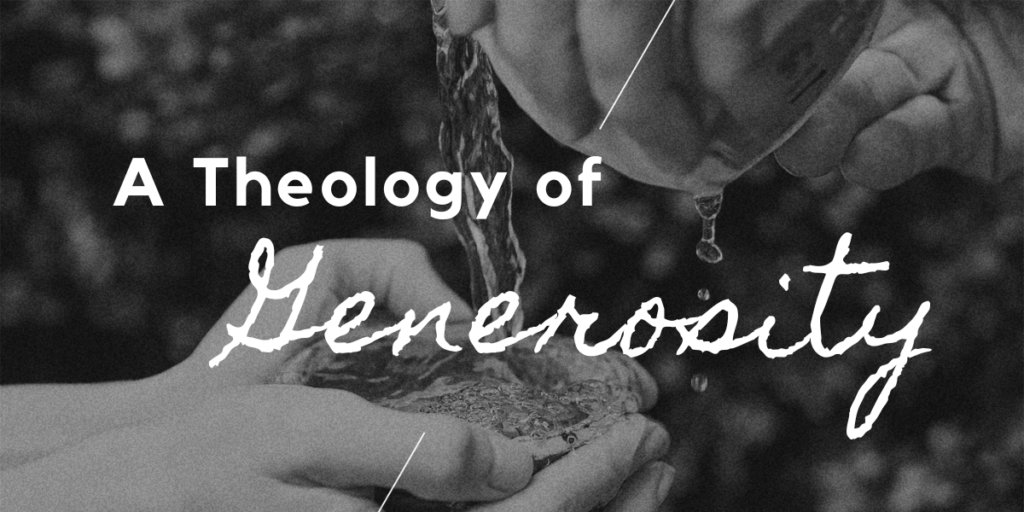
A Theology of Generosity
Part 1: Generosity, the Gospel, and God’s People
Have you realized that the Apostle Paul only quotes Jesus twice in his epistles? [1] When I first learned this, I was shocked. Even though I had read his epistles at least a dozen times, I had not picked up on the lack of direct quotes from Jesus. Rather than focusing on why Paul quoted Jesus so little, I wanted to know what the two quotes were. Surely, for Paul to quote so little, the two teachings must be essential.
The first comes from 1 Corinthians 11.23-25. In this section, Paul teaches what he learned from Jesus about the Eucharist. If you look at the Gospels, you will see 1 Cor. 11.23-25 is a near-verbatim quotation of the Last Supper in Matthew, Mark, and Luke’s Gospels. Given the centrality of the Eucharist, it makes sense that Paul would repeat this story.
The second time Paul quotes Jesus is in Acts 20.35b: “Remember the words of the Lord Jesus, how he himself said, ‘It is more blessed to give than to receive.’” Interestingly, the Gospels do not record Jesus ever saying this. Perhaps Jesus himself taught this to Paul at some point. Unlike the Eucharist, however, I would not have guessed this would have been the second quote.
Think about that: the only two times Paul directly quotes Jesus feature his teachings on the Eucharist and on generosity. If we consider what Jesus himself had to say about generosity, we can see why this was important to Paul and should be important to us.
Jesus teaches in the Gospels that generosity is at the heart of God. As God is loving, kind, merciful, and just, He is also generous. When Jesus sat with the high official, Nicodemus, and shared his message of good news, he told Nicodemus, “God so loved the world, that He gave His only begotten Son.” Generosity and the Gospel are intricately entwined.
The narrative of Zacchaeus, as found in Luke 19:1-10, offers us a vivid portrait of the Gospel’s profound power to revolutionize the human heart. When we read this story, we often think of Zacchaeus as a wee little man However, in the bustling city of Jericho, Zacchaeus was anything but insignificant. His stature in society, marked by considerable wealth, stood in stark contrast to his physical height. His accumulation of riches, sadly, often came at a significant expense to his fellow citizens.
Yet, the beauty of the Gospel is evident in this: when Zacchaeus encountered Jesus, there was a seismic shift in the very core of his being. It’s awe-inspiring to observe how, upon meeting the Savior, Zacchaeus’s entire orientation—his affections, thoughts, and actions—underwent a radical transformation. Hands that once clutched coins with avarice now generously distribute to the needy. A mind that once strategized to extract unjust tax now sought restitution, pledging to repay fourfold to those he had wronged. That is a shining example of how the Gospel and generosity are entwined.
In the teachings of Jesus, we are confronted again and again with his insights on wealth and generosity. As we read through the Gospels, it becomes clear that true generosity is not merely an act; it’s the fruit of a heart transformed by God’s grace. As we grow deeper in our understanding and embrace of the Gospel, we find that our tight grip on material possessions begins to ease, and a genuine desire to give takes its place.
Now, we might think of generosity in terms of tithing, giving 10% of our income. But to boil down the concept of generosity to mere percentages would be to miss the heart of the matter, reducing it to mere legalism. Authentic generosity, as portrayed in the Scriptures, extends beyond tithing. Generosity is about living into the self-sacrificial life that Jesus modeled and gave to us. As Paul reminds us, “Though he was rich, yet for your sake, he became poor, so that you by his poverty might become rich” (2 Corinthians 8.9). If Jesus is in us, then increasingly, such an open-handed tendency will also be in us.
Jesus desires His church to be marked by a character of profound generosity. But let’s be clear: this isn’t about Jesus imposing another rule or a legal requirement for us to follow. Rather, it’s about a transformation of our inner character. As we steep ourselves in the Gospel, our priorities shift. We begin to see wealth, possessions, and generosity through the lens of Jesus’ own boundless grace – the very Jesus who spared nothing, not even His life, for our sake.
When our hearts and lives are anchored in the values of God’s kingdom, we find ourselves naturally drawn to the simplicity and sacrificial giving that Jesus embodied during His time on earth. And in embracing such generosity, we don’t just give; we bless in profound ways, mirroring the blessings we’ve so abundantly received.
Fr. Chase Campbell
[1] To be fair, Jesus and Paul both quote Leviticus 19.13 which would make it technically 3 times.

